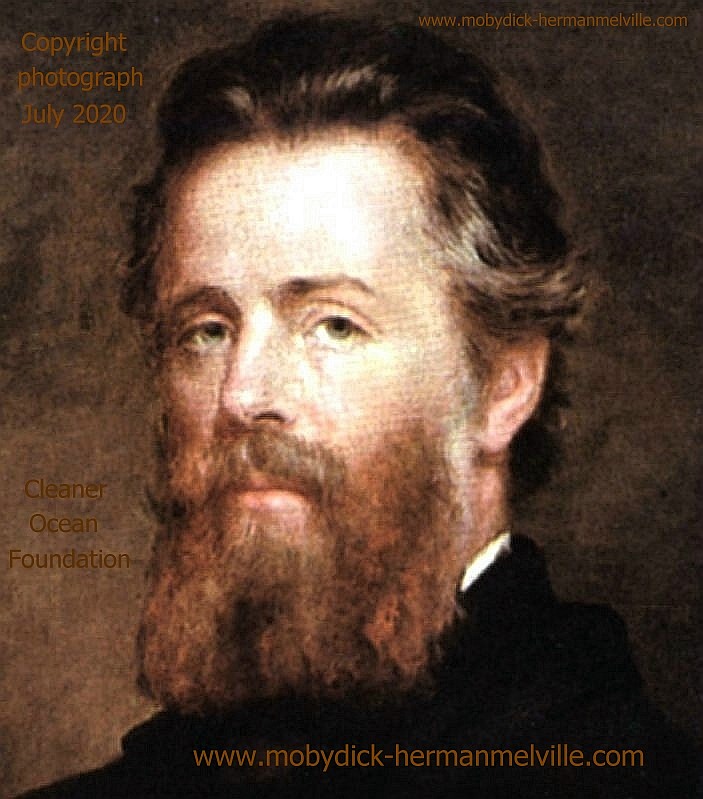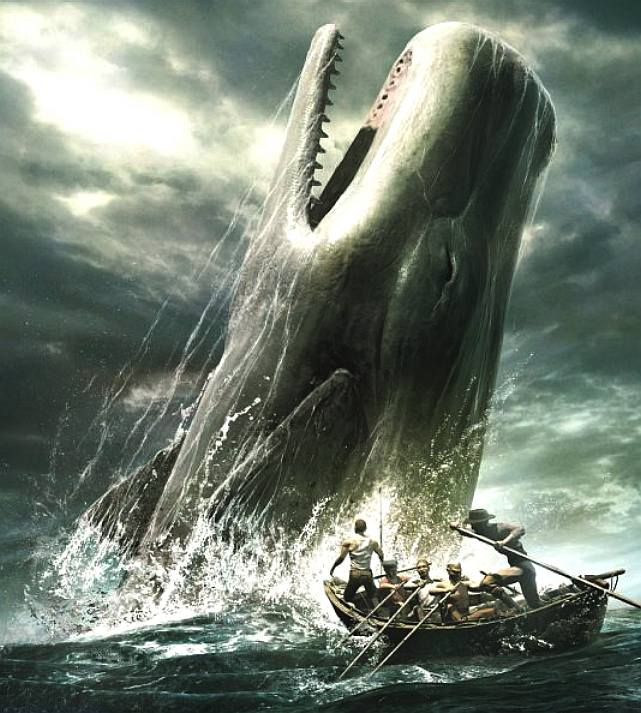
Herman
Melville was the author of a story about what we'd now consider an illegal activity,
the commercial hunting of whales for oil and meat. Whaling is still
carried out by Japan, Iceland and Canada, among other nations, though
most nations voluntarily abstain in the interests of conserving these
magnificent animals - as per International
Whaling Commission guidelines.
Back <<<
CHAPTER 33. The
Specksnyder.
Concerning the officers of the whale-craft, this seems as good a place as any to set down a little domestic peculiarity on ship-board, arising from the existence of the harpooneer class of officers, a class unknown of course in any other marine than the whale-fleet.
The large importance attached to the harpooneer's vocation is evinced by the fact, that originally in the old Dutch Fishery, two centuries and more ago, the command of a whale ship was not wholly lodged in the person now called the captain, but was divided between him and an officer called the Specksnyder. Literally this word means Fat-Cutter; usage, however, in time made it equivalent to Chief Harpooneer. In those days, the captain's authority was restricted to the navigation and general management of the vessel; while over the whale-hunting department and all its concerns, the Specksnyder or Chief
Harpooneer reigned supreme. In the British Greenland Fishery, under the corrupted title of Specksioneer, this old Dutch official is still retained, but his former dignity is sadly abridged. At present he ranks simply as senior Harpooneer; and as such, is but one of the captain's more inferior subalterns. Nevertheless, as upon the good conduct of the harpooneers the success of a whaling voyage largely depends, and since in the American Fishery he is not only an important officer in the boat, but under certain circumstances (night watches on a whaling ground) the command of the ship's deck is also his; therefore the grand political maxim of the sea demands, that he should nominally live apart from the men before the mast, and be in some way distinguished as their professional superior; though always, by them, familiarly regarded as their social equal.
Now, the grand distinction drawn between officer and man at sea, is this—the first lives aft, the last forward. Hence, in whale-ships and merchantmen alike, the mates have their quarters with the captain; and so, too, in most of the American whalers the harpooneers are lodged in the after part of the ship. That is to say, they take their meals in the captain's cabin, and sleep in a place indirectly communicating with it.
Though the long period of a Southern whaling voyage (by far the longest of all voyages now or ever made by man), the peculiar perils of it, and the community of interest prevailing among a company, all of whom, high or low, depend for their profits, not upon fixed wages, but upon their common luck, together with their common vigilance, intrepidity, and hard work; though all these things do in some cases tend to beget a less rigorous discipline than in merchantmen generally; yet, never mind how much like an old Mesopotamian family these whalemen may, in some primitive instances, live together; for all that, the punctilious externals, at least, of the quarter-deck are seldom materially relaxed, and in no instance done away. Indeed, many are the Nantucket ships in which you will see the skipper parading his quarter-deck with an elated grandeur not surpassed in any military navy; nay, extorting almost as much outward homage as if he wore the imperial purple, and not the shabbiest of pilot-cloth.
And though of all men the moody captain of the Pequod was the least given to that sort of shallowest assumption; and though the only homage he ever exacted, was implicit, instantaneous obedience; though he required no man to remove the shoes from his feet ere stepping upon the quarter-deck; and though there were times when, owing to peculiar circumstances connected with events hereafter to be detailed, he addressed them in unusual terms, whether of condescension or IN TERROREM, or otherwise; yet even Captain Ahab was by no means unobservant of the paramount forms and usages of the sea.
Nor, perhaps, will it fail to be eventually perceived, that behind those forms and usages, as it were, he sometimes masked himself; incidentally making use of them for other and more private ends than they were legitimately intended to subserve. That certain sultanism of his brain, which had otherwise in a good degree remained unmanifested; through those forms that same sultanism became incarnate in an irresistible dictatorship. For be a man's intellectual superiority what it will, it can never assume the practical, available supremacy over other men, without the aid of some sort of external arts and entrenchments, always, in themselves, more or less paltry and base. This it is, that for ever keeps God's true princes of the Empire from the world's hustings; and leaves the highest honours that this air can give, to those men who become famous more through their infinite inferiority to the choice hidden handful of the Divine Inert, than through their undoubted superiority over the dead level of the mass. Such large virtue lurks in these small things when extreme political superstitions invest them, that in some royal instances even to idiot imbecility they have imparted potency. But when, as in the case of Nicholas the Czar, the ringed crown of geographical empire encircles an imperial brain; then, the plebeian herds crouch abased before the tremendous centralization. Nor, will the tragic dramatist who would depict mortal indomitableness in its fullest sweep and direct swing, ever forget a hint, incidentally so important in his art, as the one now alluded to.
But Ahab, my Captain, still moves before me in all his Nantucket grimness and shagginess; and in this episode touching Emperors and Kings, I must not conceal that I have only to do with a poor old whale-hunter like him; and, therefore, all outward majestical trappings and housings are denied me. Oh,
Ahab! what shall be grand in thee, it must needs be plucked at from the skies, and dived for in the deep, and featured in the unbodied air!
Next
>>>
BOOK
CHAPTERS
CHAPTER 1. Loomings.
CHAPTER
2. The Carpet-Bag.
CHAPTER
3. The Spouter-Inn.
CHAPTER
4. The Counterpane.
CHAPTER
5. Breakfast.
CHAPTER
6. The Street.
CHAPTER
7. The Chapel.
CHAPTER
8. The Pulpit.
CHAPTER
9. The Sermon.
CHAPTER
10. A Bosom Friend.
CHAPTER
11. Nightgown.
CHAPTER
12. Biographical.
CHAPTER
13. Wheelbarrow.
CHAPTER
14. Nantucket.
CHAPTER
15. Chowder.
CHAPTER
16. The Ship.
CHAPTER
17. The Ramadan.
CHAPTER
18. His Mark.
CHAPTER
19. The Prophet.
CHAPTER
20. All Astir.
CHAPTER
21. Going Aboard.
CHAPTER
22. Merry Christmas.
CHAPTER
23. The Lee Shore.
CHAPTER
24. The Advocate.
CHAPTER
25. Postscript.
CHAPTER
26. Knights and Squires.
CHAPTER
27. Knights and Squires.
CHAPTER
28. Ahab, Captain.
CHAPTER
29. Enter Ahab; to Him, Stubb.
CHAPTER
30. The Pipe.
CHAPTER
31. Queen Mab.
CHAPTER
32. Cetology.
CHAPTER
33. The Specksnyder.
CHAPTER
34. The Cabin-Table.
CHAPTER
35. The Mast-Head.
CHAPTER
36. The Quarter-Deck.
CHAPTER
37. Sunset.
CHAPTER
38. Dusk.
CHAPTER
39. First Night Watch.
CHAPTER
40. Midnight, Forecastle.
CHAPTER
41. Moby Dick.
CHAPTER
42. The Whiteness of The Whale.
CHAPTER
43. Hark!
CHAPTER
44. The Chart.
CHAPTER
45. The Affidavit.
CHAPTER
46. Surmises.
CHAPTER
47. The Mat-Maker.
CHAPTER
48. The First Lowering.
CHAPTER
49. The Hyena.
CHAPTER
50. Ahab's Boat and Crew. Fedallah.
CHAPTER
51. The Spirit-Spout.
CHAPTER
52. The Albatross.
CHAPTER
53. The Gam.
CHAPTER
54. The Town-Ho's Story.
CHAPTER
55. Of the Monstrous Pictures of Whales.
CHAPTER
56. Of the Less Erroneous Pictures of Whales, and the True
CHAPTER
57. Of Whales in Paint; in Teeth; in Wood; in Sheet-Iron; in
CHAPTER
58. Brit.
CHAPTER
59. Squid.
CHAPTER
60. The Line.
CHAPTER
61. Stubb Kills a Whale.
CHAPTER
62. The Dart.
CHAPTER
63. The Crotch.
CHAPTER
64. Stubb's Supper.
CHAPTER
65. The Whale as a Dish.
CHAPTER
66. The Shark Massacre.
CHAPTER
67. Cutting In
CHAPTER
69. The Funeral.
CHAPTER
70. The Sphynx.
CHAPTER
71. The Jeroboam's Story.
CHAPTER
72. The Monkey-Rope.
CHAPTER
73. Stubb and Flask Kill a Right Whale; and Then Have a Talk
CHAPTER
74. The Sperm Whale's Head—Contrasted View.
CHAPTER
75. The Right Whale's Head—Contrasted View.
CHAPTER
76. The Battering-Ram.
CHAPTER
77. The Great Heidelburgh Tun.
CHAPTER
78. Cistern and Buckets.
CHAPTER
79. The Prairie.
CHAPTER
80. The Nut.
CHAPTER
81. The Pequod Meets The Virgin.
CHAPTER
82. The Honour and Glory of Whaling.
CHAPTER
83. Jonah Historically Regarded.
CHAPTER
84. Pitchpoling.
CHAPTER
85. The Fountain.
CHAPTER
86. The Tail.
CHAPTER
87. The Grand Armada.
CHAPTER
88. Schools and Schoolmasters.
CHAPTER
89. Fast-Fish and Loose-Fish.
CHAPTER
90. Heads or Tails.
CHAPTER
91. The Pequod Meets The Rose-Bud.
CHAPTER
92. Ambergris.
CHAPTER
93. The Castaway.
CHAPTER
94. A Squeeze of the Hand.
CHAPTER
95. The Cassock.
CHAPTER
96. The Try-Works.
CHAPTER
97. The Lamp.
CHAPTER
98. Stowing Down and Clearing Up.
CHAPTER
99. The Doubloon.
CHAPTER
100. Leg and Arm.
CHAPTER
101. The Decanter.
CHAPTER
102. A Bower in the Arsacides.
CHAPTER
103. Measurement of The Whale's Skeleton.
CHAPTER
104. The Fossil Whale.
CHAPTER
105. Does the Whale's Magnitude Diminish?—Will He Perish?
CHAPTER
106. Ahab's Leg.
CHAPTER
107. The Carpenter.
CHAPTER
108. Ahab and the Carpenter.
CHAPTER
109. Ahab and Starbuck in the Cabin.
CHAPTER
110. Queequeg in His Coffin.
CHAPTER
111. The Pacific.
CHAPTER
112. The Blacksmith.
CHAPTER
113. The Forge.
CHAPTER
114. The Gilder.
CHAPTER
115. The Pequod Meets The Bachelor.
CHAPTER
116. The Dying Whale.
CHAPTER
117. The Whale Watch.
CHAPTER
118. The Quadrant.
CHAPTER
119. The Candles.
CHAPTER
120. The Deck Towards the End of the First Night Watch.
CHAPTER
121. Midnight.—The Forecastle Bulwarks.
CHAPTER
122. Midnight Aloft.—Thunder and Lightning.
CHAPTER
123. The Musket.
CHAPTER
124. The Needle.
CHAPTER
125. The Log and Line.
CHAPTER
126. The Life-Buoy.
CHAPTER
127. The Deck.
CHAPTER
128. The Pequod Meets The Rachel.
CHAPTER
129. The Cabin.
CHAPTER
130. The Hat.
CHAPTER
131. The Pequod Meets The Delight.
CHAPTER
132. The Symphony.
CHAPTER
133. The Chase—First Day.
CHAPTER
134. The Chase—Second Day.
CHAPTER
135. The Chase.—Third Day.
Epilogue

Moby
Dick is the antogonist in this story of a great white 'bull' sperm whale that fought back at
whalers who tried to harpoon him.
The idea came to
Herman Melville after
he spent time on a commercial whaler, where stories abounded of the
sinking of the Essex in 1821 and Mocha
Dick, a giant sperm whale that sank around 20 ships, before being
harpooned in 1838.
Herman
realised how fixated the sailors became, and he also became with the
thought that there was a whale that nobody could catch, that represented
a real risk to the whalers hunting whales, in that it was more sport
than commercial operations.
Without
any doubt this is one of the greatest novels coming out of America at
this time and way off the beaten track, making it so interesting,
reflecting the state of whaling and the economic importance in the
developing the nation - giving the general public a taste of something
adventurous that most people never think about.
Many
films and graphic novel adaptations have been inspired by the writings
of Herman Melville, from Marvel
and Disney
comics with good cause.
One
such production in 2020 is a graphic novel about a giant humpback whale
called Kulo
Luna, that sinks a modern whaling boat, much as depicted in Herman
Melville's Moby
Dick, except that is this day and age whales have explosive harpoons
to contend with, and sonar, from which there is no escape.
Please use our
A-Z INDEX to
navigate this site

